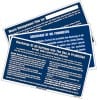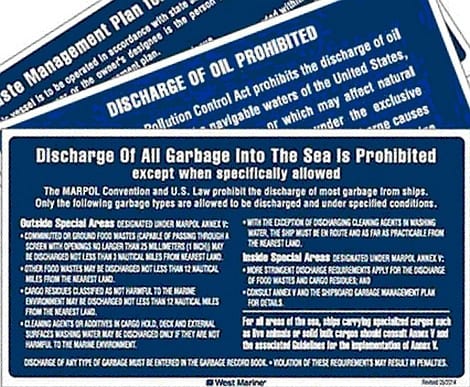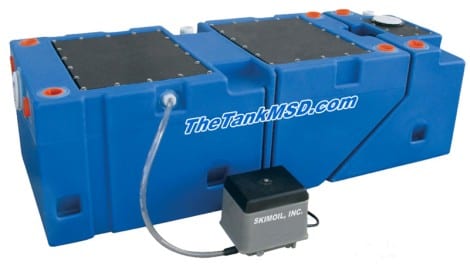 By Bob Currie, Vessel Examiner
By Bob Currie, Vessel Examiner
United States Coast Guard Auxiliary Flotilla 081-06-08
USCG Auxiliary Flotilla 081-06-08 is based at Coast Guard Station Galveston. The Auxiliary’s vessel examiners perform safety checks on all types of recreational boats. In this discussion of the Vessel Safety Check (VSC), we will discuss the requirements for prevention of water pollution.
Pollution Placards (Oily Waste Discharge)
The Refuse Act of 1898 prohibits throwing, discharging, or depositing any refuse matter of any kind (including trash, garbage, oil, or other liquid pollutants) into the waters of the United States. This regulation has been in effect almost 120 years!
- Vessels over 26 feet with a machinery compartment must display an oily waste “pollution” placard, at least 5 x 8 inches, made of durable material, fixed in a conspicuous place in the machinery spaces, or at the bilge pump control station.
- A fixed or portable means to discharge oily waste to a reception facility is required.
- A bucket or bailer is suitable as a portable means of discharging oily waste on recreational vessels.
- No person may intentionally drain oil or oily waste from any source to the bilge of any vessel.
- The Coast Guard must be notified immediately if a vessel discharges oil or hazardous substances into the water. Call the National Response Center at 1-800-424-8802.

MARPOL Trash Placard
Boats 26 feet and over in length, operating in U.S. navigable waters, must display a “MARPOL” trash placard. It is illegal to dump plastic trash anywhere in the ocean or navigable waters of the United States. It is also illegal to discharge garbage in the navigable waters of the United States, including the Great Lakes. The discharge of other types of garbage is permitted outside of specific distances offshore, based on the nature of that garbage. United States oceangoing vessels 40 feet or longer that are engaged in commerce or are equipped with a galley and berthing must have a written waste management plan describing the procedures for collecting, processing, storing, and discharging garbage and must designate the person in charge of carrying out the plan.
Marine Sanitation Device
Any INSTALLED toilet must be a Coast Guard approved device. Overboard discharge outlets must be capable of being sealed. All recreational vessels with installed toilet facilities must have an operable marine sanitation device (MSD) on board. Vessels 65 feet and under may install a Type I, II, or III MSD.
Type I and Type II are flow through devices, while a holding tank is a Type III device.

All installed MSDs must be U.S. Coast Guard certified and so labeled, except for some Type III holding tanks which are certified by definition under the regulations. Type III holding tanks are designed for the storage of sewage and flush water and may be of various design including commercially manufactured and home built tanks or other containers. The discharge of treated sewage is allowed within three nautical miles of shore except in designated no discharge zones. Untreated sewage may be discharged beyond that three mile limit. In Texas, no sewage can be discharged within inland waters (lakes and rivers). Although Texas follows the federal regulations on coastal waters sewage disposal, Florida’s no discharge zone extends to nine nautical miles from shore.
Be sure to know the regulations of the state within whose limits you are operating your boat. The Texas Commission on Environmental Quality (TCEQ) has an additional requirement that any boat with a permanently installed marine sanitation device (MSD) is required to obtain an MSD certification and display a certification decal if the boat is operated on any waters in Texas, including coastal waters up to three nautical miles from shore. For certification and decal information contact: www.tceq.texas.gov or (512) 239-0400.
For more information on boating safety, please visit the Official Website of the U.S. Coast Guard’s Boating Safety Division at www.uscgboating.org. Questions about the U.S. Coast Guard Auxiliary or our free Vessel Safety Check program may be directed to me at [email protected]. I am available to perform free Vessel Safety Checks, and I will come to your location to perform them. SAFE BOATING!
[10-23-2017]

 Posted in
Posted in 























